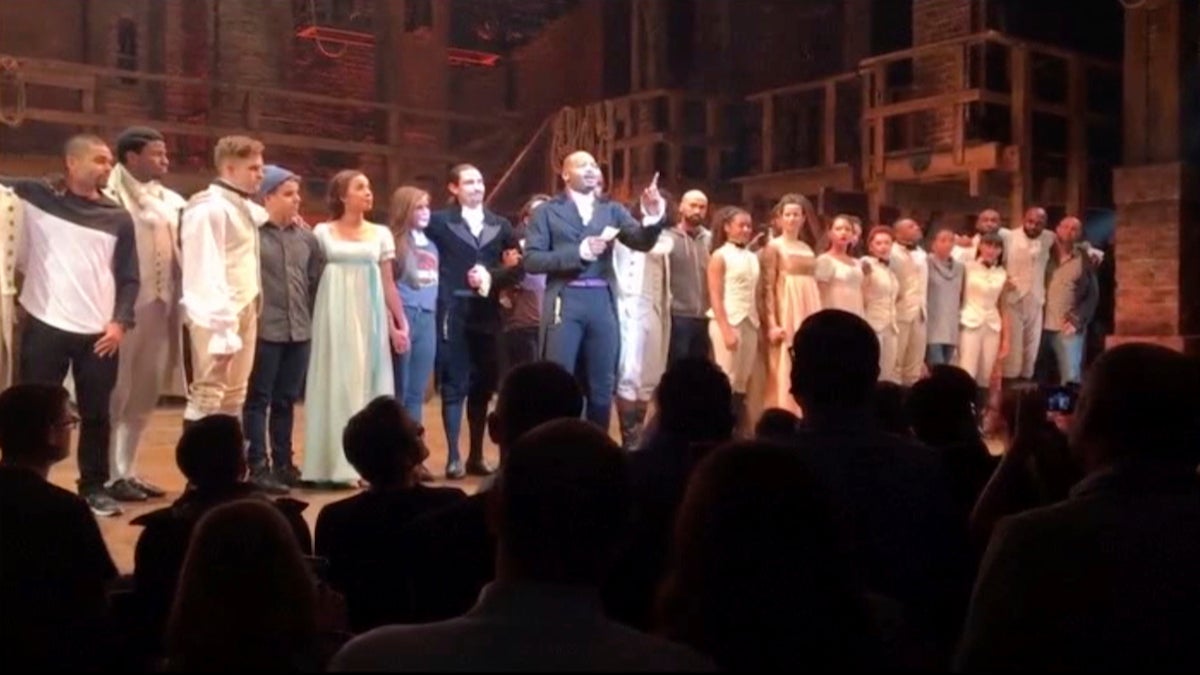When ‘Hamilton’ cast spoke to Pence, they spoke for me

In this image made from a video provided by Hamilton LLC
When Vice-President-elect Mike Pence went to see the hit Broadway play “Hamilton” this past weekend, the cast — with producers’ permission — delivered a message to the conservative politician.
As the play ended, Brandon Victor Dixon, a black actor who portrays Vice President Aaron Burr in the Tony award-winning play, acknowledged Pence, thanked him for attending, and addressed the Vice President-elect from the stage. “We, sir — we — are the diverse America who are alarmed and anxious that your new administration will not protect us, our planet, our children, our parents, or defend us and uphold our inalienable rights,” Dixon said. “We truly hope that this show has inspired you to uphold our American values and to work on behalf of all of us.”
Though Pence himself told reporters he was not offended by Dixon’s remarks, President-elect Donald Trump took to Twitter to pan the “Hamilton” cast, demanding that they apologize for being “rude” to Pence.
If that response is indicative of how Trump will handle criticism as president, free speech is under attack, and we must all be prepared to defend it.
Americans should never have to apologize for peacefully expressing dissent, dissatisfaction or disagreement with our government. In fact, it is our duty to do so.
Trump’s demand for an apology not only shows a fundamental misunderstanding of that concept. It also illustrates that Khizr Khan — the Muslim father of a U.S. soldier killed in combat — was right to ask if then-candidate Donald Trump had ever read the U.S. Constitution.
If Trump had internalized just a portion of that seminal American document, he would understand that the Constitution grants the cast of Hamilton, and indeed any American, the right to speak freely and without apology. He would know that this is especially true where the government is concerned.
This right is enshrined in our Constitution’s First Amendment, which expresses it far more eloquently than I could.
“Congress shall make no law respecting an establishment of religion, or prohibiting the free exercise thereof; or abridging the freedom of speech, or of the press; or the right of the people peaceably to assemble, and to petition the government for a redress of grievances.”
In other words, no American should ever fear being targeted for their religious beliefs, or for speaking freely, or for expressing their dissatisfaction with the government. If Americans are targeted for any of those reasons, a free and unfettered press should be available to protect those rights, to speak up against government repression, and to remind us all of who we are as a people.
That’s the America that we should all be fighting for, and the president-elect should be on the front lines of that struggle.
Instead, to the dismay of many Americans, Donald Trump remains engaged in petty online spats with those who dare to criticize him. And he seems intent on targeting the very freedoms the First Amendment protects.
At various times, Trump has indicated that Muslims could be targeted due to their religion, that Black Lives Matter protesters could be investigated after engaging in free speech, and that press outlets could be sued for pursuing stories unfavorable to Trump.
Those sound like the policies of a totalitarian regime, and I, like the cast of “Hamilton,” am anxious and alarmed.
But I am more concerned with Trump’s actions than I am with his words, especially when it comes to the individuals he’s chosen to fill key positions in his administration.
Sen. Jeff Sessions, Trump’s choice for attorney general, was denied a federal judgeship, in part because of concerns about various statements he made that were believed to be racist. Trump’s chief strategist, Steve Bannon, ran a news organization that Bannon himself called a platform for the so-called alt-right — a movement that has been associated with white nationalism. Trump’s prospective national security advisor, retired Lt. Gen. Michael Flynn, has tweeted that fear of Muslims is “rational,” shared false news stories on social media, and interacted with far-right figures on Twitter who regularly denigrate women and minorities.
So yes, I am apprehensive about the Trump administration’s posture toward religious minorities and Americans of color, and I share the concerns voiced so eloquently by the cast of “Hamilton.”
But more than I support the sentiments of the “Hamilton” cast, I support their right to voice them.
It is a right that’s enshrined in the U.S. Constitution, and it’s a right that we must always fight to keep.
WHYY is your source for fact-based, in-depth journalism and information. As a nonprofit organization, we rely on financial support from readers like you. Please give today.


